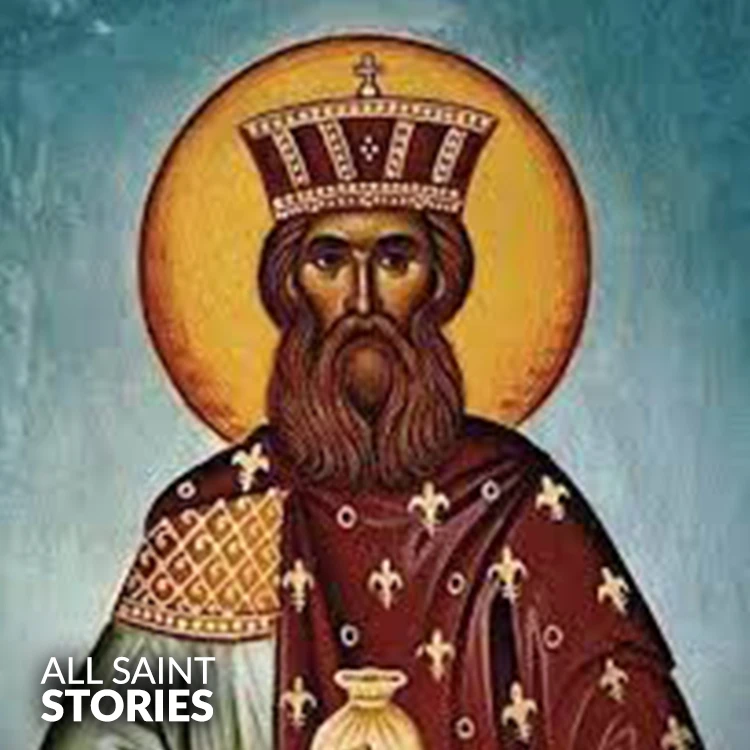O Saint Gontran, faithful servant of God, Intercede for us with your gentle heart. Guide us in our struggles, strengthen us in our faith, And lead us to walk in the light of God's love. Help us to live with kindness, patience, and humility, And may we, through your example, grow closer to Christ. Amen.
ST. GONTRAN
ST. GONTRAN

Saint Gontran was the King of Burgundy who ruled justly and showed great care for his people. His feast day is celebrated on March 28.
Saint Gontran was born around 525 AD and was the eldest son of King Clovis I of the Merovingian dynasty. He became King of Burgundy in 561 AD following the division of the Frankish kingdom after the death of his father. Known for his wisdom, generosity, and piety, Gontran ruled with a deep sense of justice and compassion, earning a reputation as a fair and charitable ruler.
Saint Gontran's reign is notable for his efforts to protect and provide for his people. He was deeply involved in the administration of justice and was known for his charity, particularly toward the poor. His rule was marked by a concern for the welfare of his subjects, and he took measures to protect them from injustice, oppression, and the hardships of war.
During his reign, Gontran also worked to strengthen the Christian faith in his kingdom. He was a devout Christian and supported the Church’s efforts to spread the faith and care for the faithful. He was known for his deep religious convictions and for helping to establish and support monasteries and the Christian community in Burgundy.
One of the most significant moments of Gontran's reign was his care for the Church's authority and the resolution of conflicts within his kingdom. He played a crucial role in maintaining peace and stability, not only for his kingdom but also for the broader Frankish realm. Despite the challenges of his time, including the pressures of the Merovingian court and the political turmoil in the Frankish kingdom, Gontran remained a stabilizing and moral influence.
Saint Gontran's life was also marked by personal humility and devotion. After ruling for several decades, he chose to retire to a life of solitude and prayer. He died on March 28, 593, at the age of 68. His death was deeply mourned by his people, who remembered him as a king who put the well-being of his people and the Church before his own desires.
Though Saint Gontran was never formally canonized, he has been revered for his virtuous life, his devotion to God, and his compassionate rule. His feast day is celebrated on March 28, the anniversary of his death. His legacy continues to serve as an example of just leadership and selfless care for others.
Video Not Found
No images uploaded for this saint yet.
The information on this website is compiled from various trusted sources. While we aim for accuracy, some details may be incomplete or contain discrepancies.
If you notice any errors or have additional information about this saint, please use the form on the left to share your suggestions. Your input helps us improve and maintain reliable content for everyone.
All submissions are reviewed carefully, and your personal details will remain confidential. Thank you for contributing to the accuracy and value of this resource.
Credits & Acknowledgments
- Anudina Visudhar (Malayalam) – Life of Saints for Everyday
by Msgr. Thomas Moothedan, M.A., D.D. - Saint Companions for Each Day
by A. J. M. Mausolfe & J. K. Mausolfe - US Catholic (Faith in Real Life) – Informational articles
- Wikipedia – General reference content and images
- Anastpaul.com – Saint images and reflections
- Pravachaka Sabdam (Malayalam) – Saint-related content and insights
We sincerely thank these authors and platforms for their valuable contributions. If we have unintentionally missed any attribution, please notify us, and we will make the correction promptly.
If you have any suggestion about ST. GONTRAN
Your suggestion will help improve the information about this saint. Your details will not be disclosed anywhere.
© 2026 Copyright @ www.allsaintstories.com


 English
English
 Italian
Italian
 French
French
 Spanish
Spanish
 Malayalam
Malayalam
 Russian
Russian
 Korean
Korean
 Sinhala
Sinhala
 Japanese
Japanese
 Arabic
Arabic
 Portuguese
Portuguese
 Bantu
Bantu
 Greek
Greek
 German
German
 Dutch
Dutch
 Filipino
Filipino